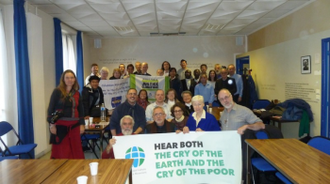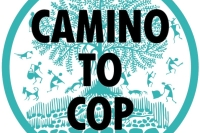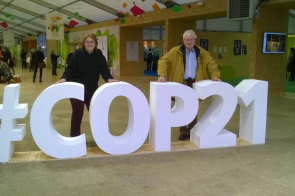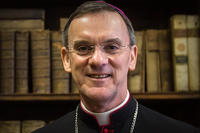Paris Blog 8: Rise of the Global Catholic Climate Movement

I was sitting opposite a mural of a cow with its tail raised and the caption, "Its not a cow, it's a windmill". This distracted me until I was told it referred to the use of cow manure for energy in Indonesia. 'Charming', I thought, but I couldn't move seat; the room was too packed. More than 30 people were gathered in a meeting room of CCFD - Terre Solidaire, a Catholic non-governmental organisation involved in the Catholic presence at COP21. They represented some of the Catholic groups in Paris to lobby the UN Climate meeting for action to keep global warming below 1.5 degrees celsius.
The meeting was organised by the Global Catholic Climate Movement, which was initiated just ten months ago and has already stimulated an international Catholic climate petition of more than 840,000 signatures. Two of the founders, Tomas Insua and Patrick Carolan of the Franciscan Action Network, chaired the meeting, and expressed gratitude to other founders including Fr John Leydon, an Irish Columban working in the Philippines.
Wow, what an inspiring gathering it was. Columban Missionaries and Westminster J&P sat alongside Caritas Internationalis, CIDSE, Trocaire, Jesuit European Social Centre, Ecojesuit, Franciscans International, Our Voices, People's Pilgrimage. Augustinian Recollects - Philippines, and Chrétiens Unis pour la Terre. There were many Franciscans from such far flung places as India, Australia, Brazil, Netherlands and Rome, and a bloc of Jesuits from Philippines, Belgium and Spain; also Capuchin JPIC from the US and Ecuador, and an Assumption priest.
Ghanaian Archbishop Gabriel Justice Yaw Anokye of Kumasi, the President of Caritas Africa and the second vice-president of Caritas Internationalis, opened the gathering with a prayer, thanking God for the opportunity to be at COP21 and asking for God's help "for us to develop our strategy to protect the Earth for future generations". As the meeting got underway, it was clear there was an incredible wealth of experience in the room. Some had worked on the impact of extractive industries in Latin America and with the Pan Amazonia Network to protect rainforest. Filipino religious had gathered signatures for the Global Catholic Climate petition for COP21, showing a poster of Pope Francis and Cardinal Tagle of Manila with the petition and the caption, "They have signed, how about you?" One person held up a batch of petitions signed by people in a region devastated by Typhoon Haiyan two years ago. Others, including the Columbans, had produced study programmes around Laudato Si', and education work linking faith and environment.
The Director of Catholic network CIDSE, Bernd Nilles, said that in his view the Global Catholic Climate Movement has "put the petition into the political arena". But where will the Global Catholic Climate Movement go from here? Momentum built up this year with the COP21 negotiations at the end of 2015 and the release of Laudato Si' in June. Catholics are now more readily engaging with the international ecological movement, but what will the future focus be? Any climate change campaigning is a long haul. As one person said: "However well Paris turns out it is still going to be inadequate to meet what needs to be done on climate change."
In 2016, the Catholic climate petition will continue on and off line, as advocacy on climate change must continue. Some senior clergy and bishops' conferences are still not on board with the climate justice issue and further efforts will be made to engage them. Study groups and talks on climate change will be promoted and resources information shared on websites. The ecumenical Season of Creation - 1 September to 4 October - will be pushed through Catholic networks, and especially the annual day of prayer for safeguarding Creation on 1 September. A Lent 2016 Fast for Climate Justice will be promoted. Columban Charles Rue spoke of materials produced in Australia on spirituality and ecology, all with a view to promoting the "ecological conversion" urged in Laudato Si'. The Jesuits have a 'Healing Earth' project to download.
While advocacy will remain a priority, collaboration with other faiths and the wider climate movement will be further nurtured. Capuchins and Columbans reported that in some countries where they work - such as India and Pakistan - advocacy work on climate justice must be done in an inter-faith way to be effective because Christians are a minority community. Also, links with other struggles in the areas of justice and peace - such as the destructive behaviour of large mining companies in biodiverse areas populated by indigenous peoples. "Climate change is not just an issue of climate" reflected one person. There was a commitment to support communities in the Philippines trying to stop the construction of 39 new coal-fired power stations. Toolkits for parishes examining lifestyle choices are in the pipeline. In all this, social media will be exploited as fully as possible, and close collaboration with successful campaigning groups such as Avaaz and 350 degrees.
There have been signs of hope this year. Catholics have been involved in successful campaigns to get Shell to abandon drilling in the Arctic and the Keystone Pipeline project to be suspended in the US. The list of institutions divesting from fossil fuels is growing, along with religious and others positively investing in renewables. The big Catholic development agencies are bringing decarbonisation into their policies. There are many campaigns in the Catholic world - more than in civil society - around living more simply and reducing energy demand. Yet, there is much to do. The dimension of climate justice needs to be underlined constantly. Yeb Sano of the Philippines pointed to a recent Oxfam study which reported that 10 percent of the richest people in all countries account for 50 percent of carbon emissions; the injustice is not just North/South but within countries.
There was considerable interest in the idea of Columban eco-theologian Sean McDonagh to urge a Synod looking at the links between Catholic spirituality and Creation. The idea was endorsed at least four times during the meeting.
Towards its end a senior staff member of CCFD joined the group to announce that, after negotiations with the French Government, the mobilisation of 12 December at the end of COP21 will be permitted. You will remember that the one at the beginning of the conference was banned and so the 'marching shoes' were placed in Place de la Republique instead - or some of us did actually line Boulevard Voltaire anyway, holding hands and praying. It will be great that the citizens' movement for climate justice can be more visible here in Paris on 12 December, and that includes the Catholic community.
For more information see: www.catholicclimatemovement.global/


















